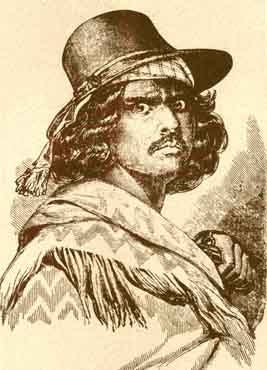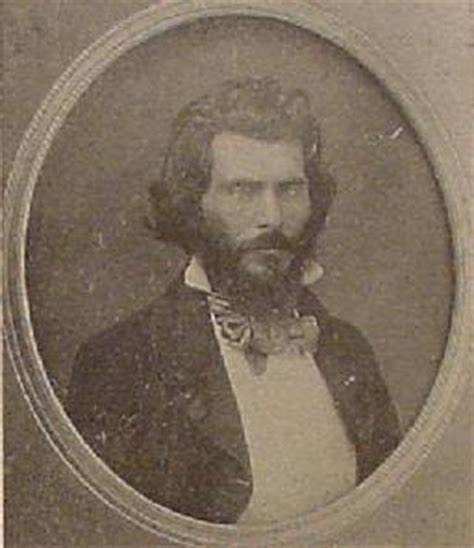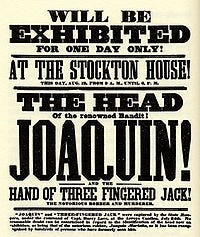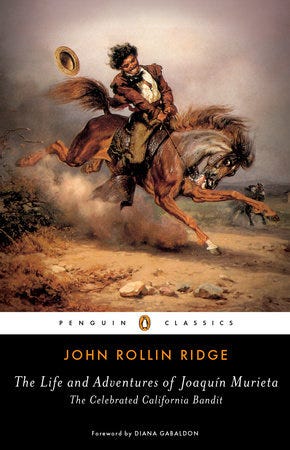Who is Joaquin Murieta and Why Had I not Heard of Him?
It's a real question. Why is this bandit, who terrorized people throughout 1850s California, a new discovery for me? Murieta is everywhere and nowhere at the same time. He hides behind the tale of Zoro. He lived on somewhat fictionalized in plagiarized ma
It's a real question. Why is this bandit, who terrorized people throughout 1850s California, a new discovery for me? Murieta is everywhere and nowhere at the same time. He hides behind the tale of Zoro. He lived on somewhat fictionalized in plagiarized magazine and radio serials. Countless westerns used his life as a model for their honorable bandits. But he himself is lost to time.
Did I not pay attention in school? Did I simply miss a museum display? Are the street names I pass every so often just generic? Is Rancho Murieta named after him? That would be ironic; a gated community named for a man who illuded all capture and fences.
I set out on a quest this year to read more books by people of color. I want to know what's out there and to support their voices. The difference between speaking up for somebody and supporting somebody who is already speaking is a whole nother story, but an important one. And yet I get stuck, stuck in this endless loop of wanting to read really old books. So I bought some books by people who are alive (next on my list) and then I set out to read the 1854 novel The Life and Adventures of Joaquin Murieta by John Rollin Ridge (definitely dead).
What drew me to this book
I studied the political factions of the Cherokee Nation for my writing and I knew a signer of the Treaty of New Echota had a son who wrote a novel. I didn't care what it was, I wanted to see it, and to see how the events of his life crept into his writing. Ridge's father knew he would die for signing that treaty and he did, supposedly right in front of the children, so you know...already there is tension.
Ridge was one of the first Native American novelists. After killing a horse thief, he fled to California and tried his hand at mining but eventually moved on to literary pursuits, even becoming an editor and writer for the Sacramento Bee and the San Fransico Herald.
Like any product of his time, Ridge was complicated. His writing reinforced events of his life, be it his father's killing, his people forced off their land, his white mother of course being innocent in all matters, etc. He very much had revenge on his mind. He was proslavery, pro assimilation, did not think the Chinese intelligent, and at one point I couldn't believe my eyes when in his novel he concluded that even the faintest thought would cause a beautiful woman to swoon, as if beauty took so much effort that there is room for little else.
What can I do but learn what people were like? For science! Davey Crocket and Sam Houston didn't fare much better on the closet skeleton test. Nobody does.
Back to Joaquin, the Robin Hood of the West
Like a true reporter, Ridge collected evidence, talked to witnesses, and filled in a few blanks here and there to make this book about Joaquin Murieta, the celebrated California bandit. He later published further editions with more information to counteract the plagiarised pieces floating out there.
Joaquin tried to be an honorable person but at every turn, people (Americans, as they are truthfully called), drove him off his land, ransacked his belongings, ravaged his wife, stole his gold, etc. They eventually hung his brother.
Something in Joaquin snapped. He wanted only revenge. So he spent the rest of his short life gathering followers, horses, gold, etc. to stage an attack on the Americans in one large swoop. It seems the entirety of California had gotten a little anxious to say the least. He had with him a bloodthirsty man they called Three Fingered Jack who had little self-control, and several other more discerning band members.
Joaquin never took from the poor, earning him the name Robbin Hood of the West.
He met his demise at the hands of H. Love's men, and his head was packed in alcohol and paraded around. You know, to prove he was dead? And Three-Fingered Jack's hand also made the rounds. People could see the head for $1, about $33 in today's money.
Now, much of the character of these people is speculation that each author makes. I won't sit here and write a character essay, but I do think Ridge made an excellent point. Treat your fellow humans well.
In closing
Like all people with something to say, Ridge had discoverable skeletons in his closet, but the message is still there. It took many two-page victorian style paragraphs to say "don't be an asshole to your fellow man." Here's his short version:
"...There is nothing so dangerous in its consequences as an injustice to individuals—whether it arises from prejudice of color or from any other source; that a wrong done to one man is a wrong to society and to the world."
I think the pain in Ridge's life clearly came out on paper, and that he also took notice of the injustice around him. He didn't sit idly by, but he spoke up in the form of a story, something that is hard for people to reject. Stories soften hearts and humanize people. Stories make people think.
Would I recommend this book?
Yes, especially if you live in California. I found myself following these characters through places like the tent cities of Marysville, the town of Stockton, and the fields of Nicolas. It's probable that my friends and I tread on the very same ground as we played airsoft on the Feather River. If you can set aside modern-day knowledge of science on matters of race and gender, and can endure paragraphs that should have been split into eight paragraphs, and enjoy the editorial style (lots of telling), this book is for you.
Further Reading:
https://www.georgiaencyclopedia.org/articles/arts-culture/john-rollin-ridge-1827-1867
https://www.legendsofamerica.com/ca-murieta/
https://allthatsinteresting.com/joaquin-murrieta
https://www.goodreads.com/book/show/219053.Life_and_Adventures_of_Joaquin_Murieta




